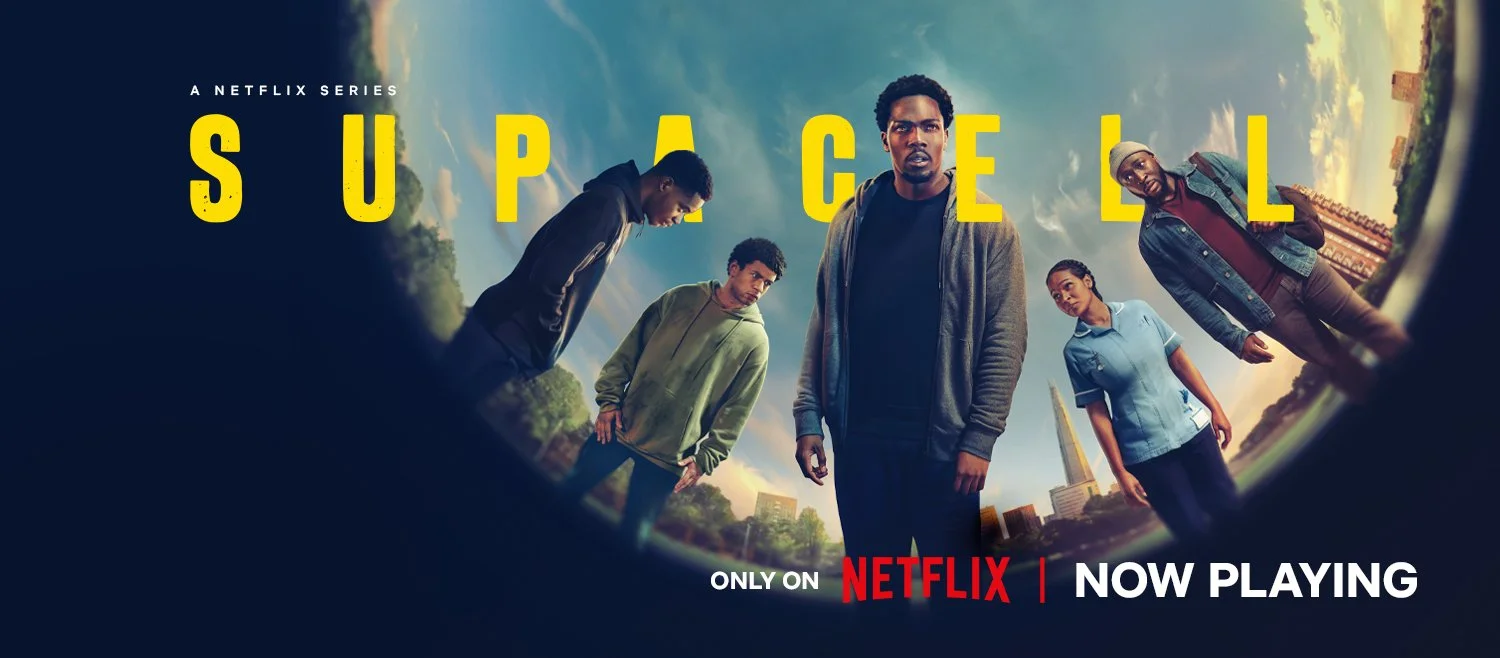Go Watch Supacell !
3 min read [Spoiler Alert]
Supacell promotion image via Netflix
Since its release on Netflix on 27 June, I have repeatedly messaged friends and family unprovoked saying, “Go watch Supacell on Netflix! Thank me later.” The TV series is said to be a first: a Black British sci-fi, based in South London, where members of the Black community are getting superpowers. Its 6-episode first season introduces us to the protagonist Michael, played by Tosin Cole, who randomly discovers his superpower of time manipulation and travels to the future where he speaks to his future self. After learning about the death of a loved one and witnessing a catastrophe, he’s now back in real time and on a mission to assemble four others with superpowers who he saw in his time travels, in hopes of preventing what is to come. Each episode is named after one of the characters to be assembled, helping us understand them more, whilst connecting their stories. Despite South London being massive with several boroughs, they all seem to be based nearby. As far as I can recall, they don’t explicitly say where in South London each is from, but if you’re familiar with South London, sights and landmarks in areas like Peckham and Brixton can be seen.
When I first saw the trailer I immediately knew that I’d have a look as it’s a Black TV series in a genre that we’re typically not the lead or the majority of the cast. Supacell is produced by Andrew Onwubolu, better known as Rapman, who also worked on projects like Blue Story. A promotional video for the series shows a clip of him on a London bus 5 years ago where he mentions that he’d love to see a story with people who are from where he is from but with superpowers. Fast forward to 2022, Netflix announced that it was commissioning the series with its debut taking place in June 2024.
My immediate love for Supacell is for a few reasons. I may not be British and my time here has not been long, but as a born and raised Afro-Caribbean man who loves cultural exchange and creativity, I’ve tried to sponge up a lot of knowledge around Black British culture. It’s complex and mixed with a heavy dose of identity politics, however, it’s a raw quest of a resilient community that still endures being othered. I believe it’s that experience that makes the imaginative world of Supacell relatable to Black Brits, but also to many in the Black diaspora. I think of the reception Black Panther got when it was released - a major Marvel studio film that showed us in our regalia and superpower glory - something which we’ve had to fight to prove the world over when structural racism told us for centuries that our humanity was worthless. The symbolism in Supacell of an institution spying, deceiving and attempting to control a population of people of our kin is all too familiar for many of us, given our histories in Britain, the US, Africa and the Caribbean. The fantasy of being empowered to easily combat and fight this system of power intrigues us, without us even realising it.
Lead character Michael activing his powers shown by the change of eye colour.
My biggest applause for Supacell is the excellent link of the supacell derivant to that of sickle cell anaemia, a disease that has had long standing effects in Black communities. It points to the real scenarios that Black families face with health matters, especially around diseases like hypertension and diabetes and our increased risks for such. It shows our vulnerability and the emotions around how we relate to those near and dear to us. In an interview that Rapman had in collaboration with Sicklecell UK, he stated that the yellowing of the eyes when those with the supacell used their powers, was a nod to the sickle cell warriors experiencing jaundice. I had to give him extra points for this type of creativity. These themes were incorporated in a simple yet effective way that makes for a strong connection, which is the heart of the storyline beyond the fantasy and sci-fi genre.
So, what’s the biggest drawback with Supacell you might ask? It’s the fact that we need more seasons immediately! The first 5 episodes took their time with the character introductions and setting the scene, with the last episode, named Supacell, giving us all the punch and action that will take us through to another season. It’s not a drawback, and, a good position to be in, as it ranked #1 on Netflix in the UK and other countries just after its first weekend run and received a perfect critic score on Rotten Tomatoes.
I’ll end this how I started: Go watch Supacell! You’ll thank me later.
Written by Kearn Christopher


